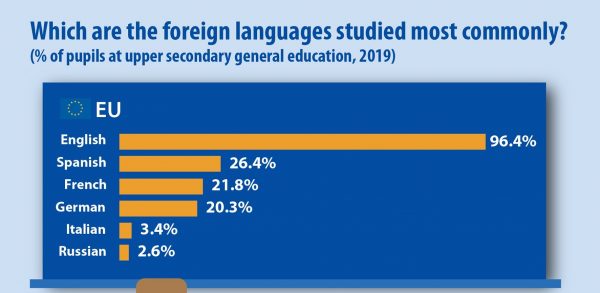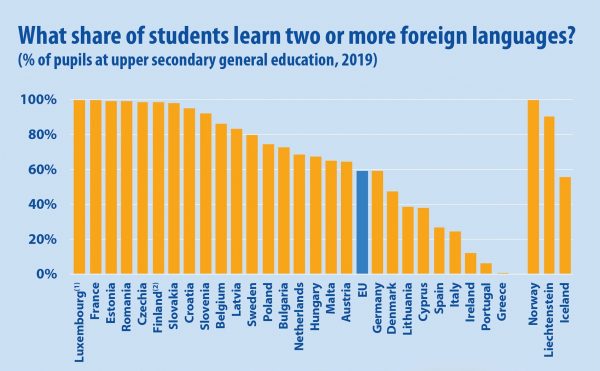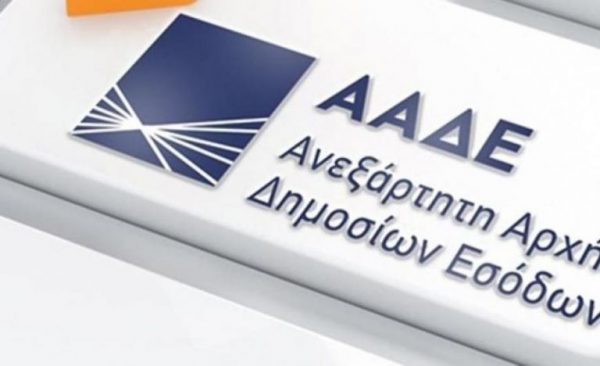![Eurostat – Greece’s ranking in foreign languages is simply disappointing [Chart]](https://www.ot.gr/wp-content/uploads/2021/09/language.jpg)
Knowledge of foreign languages is an essential tool for the citizens of the European Union – and not only – for communication with other cultures, professional development, travel, contact with new cultures, peoples and societies.
It is well known that such skills are required and encouraged in many workplaces and that they can facilitate communication in a variety of other contexts.
According to Eurostat, in 2019, 59% of upper secondary students (ISCED level 34) studied two or more foreign languages in the EU.
In two EU countries, Luxembourg and France, all secondary general education students studied two or more foreign languages. Estonia, Romania, the Czech Republic and Finland also had a large proportion of students studying two or more languages (all 99%), followed by Slovakia (98%), Croatia (95%) and Slovenia (92%). .
Greece at the bottom
Eurostat data paint a very unpleasant picture for Greece, as it not only figures at the end of the ranking, but is by far the worst of all EU member states, in terms of this performance. Only 1% of students in secondary general education studied two or more foreign languages in 2019.
A low percentage of students was also recorded in: Portugal (6%), Ireland (12%), Italy (25%) and Spain (27%).

The most popular language
In 2019, English was the most frequently studied foreign language at the level of secondary general education in the EU, with 96% of students learning it. Spanish ranks second (26%), followed by French (22%), German (20%) and Italian (3%). In addition, Russian was the non-Community language most frequently learned in the EU (3%), especially in Estonia (68%) and Latvia (57%), followed by Lithuania (30%) and Bulgaria (24%). 
Latest News

Economist: Greece Included in the Best Performing Economies in 2024
Meanwhile, Northern European countries disappoint, with sluggish performances from the United Kingdom and Germany.

EasyJet Expands Its Routes from Athens
The airline’s two new routes will be to London Luton and Alicante and they will commence in summer 2025.

Capital Link Forum Highlights Greece’s Economic Resurgence; Honors BoG Gov Stournaras
Capital Link Hellenic Leadership Award recipient, Bank of Greece Gov. Yannis Stournaras, an ex-FinMin, was lauded for his pivotal role during Greece’s economic recovery

Tourist Spending in Greece Up by 14%, Visa Card Analysis Shows
Greece’s capital Athens emerged as the most popular destination, recording a 17% increase in transactions with Visa cards, surpassing even the cosmopolitan island of Mykonos.

Inflation in Greece Unchanged at 2.4% in Nov. 2024
The general consumer price index (CPI) posted a 0.4% decrease in November compared to the previous month

2024 Christmas Holidays: Extended Shop Hours Schedule
The 2024 Christmas Holidays extended shop hours schedule commences on Thursday, December 12 and runs until the end of the year.

ELSTAT: Seasonally Adjusted Unemployment Down in October
The number of employed individuals reached 4,284,694, an increase of 67,723 compared to October 2023 (+1.6%) and 22,002 compared to September 2024 (+0.5%).

Greek PM’s Chief Economic Adviser Resigns
In the post on his Facebook page, Patelis did not disclose the reasons that led him to step down.

“Masdar Invests in the people of Greece and in the vision of TERNA ENERGY”
Four messages from the CEO of Masdar, the Arab renewable energy giant, after its acquisition of 70% of TERNA ENERGY

Lloyd’s List Greek Shipping Awards 2024: Honors for leading companies and personalities in the Greek shipping sector
20 awards presented at the 21st annual Lloyd's List Greek Shipping Awards


















![Χειμερινή εξοχική κατοικία: Οι Ελληνες γυρνούν την πλάτη παρά την πτώση των τιμών [γραφήματα]](https://www.ot.gr/wp-content/uploads/2024/12/Capture-19-90x90.jpg)
























 Αριθμός Πιστοποίησης Μ.Η.Τ.232433
Αριθμός Πιστοποίησης Μ.Η.Τ.232433